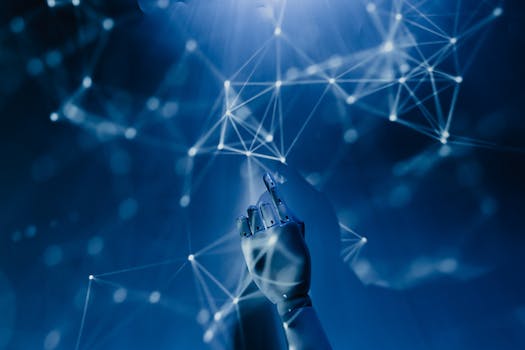-
Table of Contents
Unveiling the Influence of AI on the Future: Part I – Exploring the Power of Artificial Intelligence.
Introduction
Unveiling the Influence of AI on the Future: Part I explores the profound impact that artificial intelligence (AI) is expected to have on various aspects of our lives. This article delves into the potential implications of AI advancements, ranging from healthcare and transportation to education and employment. By examining the current state of AI technology and its projected trajectory, we aim to shed light on the transformative power of AI and the opportunities and challenges it presents for the future.
The Role of AI in Transforming Industries
Unveiling the Influence of AI on the Future: Part I
Artificial Intelligence (AI) has emerged as a transformative force in various industries, revolutionizing the way businesses operate and paving the way for a future that was once only imaginable in science fiction. From healthcare to finance, AI has the potential to reshape every sector, bringing about unprecedented advancements and efficiencies. In this article, we will explore the role of AI in transforming industries and the implications it holds for the future.
One of the key areas where AI is making a significant impact is healthcare. With the ability to analyze vast amounts of medical data, AI algorithms can assist doctors in diagnosing diseases more accurately and efficiently. By leveraging machine learning techniques, AI systems can identify patterns and anomalies in medical images, enabling early detection of conditions such as cancer. Moreover, AI-powered chatbots are being used to provide personalized healthcare advice and support to patients, reducing the burden on healthcare professionals and improving patient outcomes.
The finance industry is another sector that is being revolutionized by AI. With its ability to process large volumes of financial data in real-time, AI algorithms can make predictions and identify trends that were previously impossible for humans to detect. This has led to the rise of robo-advisors, AI-powered platforms that provide personalized investment advice to individuals based on their financial goals and risk tolerance. Additionally, AI is being used to detect fraudulent activities in banking transactions, minimizing the risk of financial crimes and enhancing security.
Manufacturing is yet another industry that is experiencing a profound transformation due to AI. By integrating AI into production processes, manufacturers can optimize operations, reduce costs, and improve product quality. AI-powered robots and machines can perform repetitive tasks with precision and speed, eliminating the need for human intervention in mundane and dangerous tasks. Furthermore, AI algorithms can analyze data from sensors and machines to predict maintenance needs, enabling proactive maintenance and minimizing downtime.
The transportation industry is also being reshaped by AI. Self-driving cars, powered by AI algorithms, have the potential to revolutionize the way we commute, making transportation safer, more efficient, and environmentally friendly. AI can analyze traffic patterns, optimize routes, and reduce congestion, leading to smoother and faster journeys. Moreover, AI-powered drones are being used for delivery services, enabling faster and more cost-effective delivery of goods.
The retail sector is not immune to the influence of AI either. AI-powered recommendation systems are being used by e-commerce platforms to personalize product recommendations based on individual preferences and browsing history. This not only enhances the shopping experience for customers but also increases sales for retailers. Additionally, AI algorithms can analyze customer data to identify trends and predict demand, enabling retailers to optimize inventory management and supply chain operations.
In conclusion, AI is playing a pivotal role in transforming industries across the board. From healthcare to finance, manufacturing to transportation, and retail to many others, AI is revolutionizing the way businesses operate and opening up new possibilities for innovation. As we move forward, it is crucial to embrace the potential of AI while also addressing the ethical and societal implications it brings. In Part II of this series, we will delve deeper into these implications and explore the challenges and opportunities that lie ahead in the AI-driven future.
Ethical Considerations in AI Development and Implementation

Unveiling the Influence of AI on the Future: Part I
Artificial Intelligence (AI) has become an integral part of our lives, revolutionizing various industries and transforming the way we live and work. As AI continues to advance at an unprecedented pace, it is crucial to examine the ethical considerations surrounding its development and implementation. In this article, we will delve into the ethical implications of AI and explore the challenges that arise in ensuring its responsible use.
One of the primary ethical concerns in AI development is the potential for bias. AI systems are trained on vast amounts of data, and if this data is biased, the AI algorithms can perpetuate and amplify existing biases. For example, facial recognition technology has been found to have higher error rates for people with darker skin tones, leading to potential discrimination in areas such as law enforcement and hiring processes. It is essential for developers to address these biases and ensure that AI systems are fair and unbiased.
Another ethical consideration is the impact of AI on employment. As AI technology advances, there is a growing concern that it will replace human workers, leading to job displacement and economic inequality. While AI has the potential to automate repetitive tasks and increase efficiency, it is crucial to find a balance between automation and human involvement. Governments and organizations must invest in retraining programs and create new job opportunities to mitigate the negative effects of AI on employment.
Privacy and data protection are also significant ethical concerns in AI development. AI systems rely on vast amounts of personal data to function effectively, raising questions about the collection, storage, and use of this data. It is crucial for organizations to be transparent about their data practices and ensure that individuals have control over their personal information. Additionally, there is a need for robust cybersecurity measures to protect against data breaches and unauthorized access to sensitive information.
The ethical implications of AI extend beyond its development and into its implementation. One key consideration is the potential for AI to be used for malicious purposes. AI-powered cyberattacks, misinformation campaigns, and deepfake technology pose significant threats to individuals and society as a whole. It is essential for policymakers and organizations to establish regulations and safeguards to prevent the misuse of AI and protect against these emerging threats.
Furthermore, the accountability and transparency of AI systems are crucial ethical considerations. As AI becomes more complex and autonomous, it becomes challenging to understand how decisions are made and who is responsible for them. This lack of transparency can lead to a loss of trust in AI systems and hinder their widespread adoption. Developers must strive to create AI systems that are explainable and accountable, allowing users to understand the reasoning behind AI-generated decisions.
In conclusion, the ethical considerations surrounding AI development and implementation are of paramount importance. Addressing biases, ensuring employment opportunities, protecting privacy and data, preventing malicious use, and promoting accountability and transparency are all crucial steps in harnessing the potential of AI while minimizing its negative impacts. As AI continues to shape our future, it is essential for policymakers, organizations, and individuals to work together to navigate the ethical challenges and ensure that AI is developed and used responsibly. Stay tuned for Part II of this series, where we will explore the social implications of AI and its impact on society.
AI’s Impact on the Job Market and Workforce Dynamics
Unveiling the Influence of AI on the Future: Part I
AI’s Impact on the Job Market and Workforce Dynamics
Artificial Intelligence (AI) has become an integral part of our lives, revolutionizing various industries and transforming the way we work. As AI continues to advance at an unprecedented pace, it is crucial to understand its impact on the job market and workforce dynamics. In this article, we will delve into the ways AI is reshaping employment and explore the potential challenges and opportunities it presents.
One of the most significant effects of AI on the job market is the automation of tasks that were previously performed by humans. AI-powered machines and algorithms can now handle repetitive and mundane tasks with greater efficiency and accuracy. This automation has led to concerns about job displacement and unemployment. However, it is important to note that while some jobs may become obsolete, new opportunities will also emerge.
The rise of AI has created a demand for a new set of skills. Jobs that require creativity, critical thinking, and problem-solving abilities are likely to be in high demand. As AI takes over routine tasks, humans will need to focus on tasks that require emotional intelligence and complex decision-making. Therefore, individuals who can adapt and upskill themselves to work alongside AI will have a competitive advantage in the job market.
Furthermore, AI has the potential to augment human capabilities, leading to increased productivity and efficiency. By automating repetitive tasks, AI frees up time for employees to focus on more strategic and value-added activities. This shift in job roles can lead to higher job satisfaction and improved work-life balance. Employees can spend more time on tasks that require human interaction and creativity, leading to a more fulfilling work experience.
However, the integration of AI into the workforce also poses challenges. One major concern is the displacement of workers in industries heavily reliant on manual labor. Jobs in manufacturing, transportation, and customer service are particularly vulnerable to automation. As AI continues to evolve, it is crucial for policymakers and organizations to develop strategies to reskill and retrain workers in these sectors to ensure a smooth transition.
Another challenge is the ethical implications of AI in the workplace. As AI systems make decisions that impact individuals’ lives, issues of bias, privacy, and transparency arise. It is essential to establish regulations and guidelines to ensure that AI is used responsibly and ethically. Organizations must prioritize transparency and accountability to build trust with employees and customers.
Despite these challenges, AI also presents numerous opportunities for innovation and economic growth. The integration of AI into industries such as healthcare, finance, and education has the potential to revolutionize these sectors. AI-powered systems can analyze vast amounts of data, leading to more accurate diagnoses, personalized financial advice, and tailored educational experiences. This technological advancement has the potential to improve the quality of services and enhance overall societal well-being.
In conclusion, AI’s impact on the job market and workforce dynamics is undeniable. While automation may lead to job displacement in certain sectors, it also creates new opportunities and demands a shift in skill sets. The successful integration of AI into the workforce requires a proactive approach from policymakers, organizations, and individuals. By embracing AI and adapting to its transformative power, we can navigate the future of work and harness its potential for the betterment of society. Stay tuned for Part II of this series, where we will explore AI’s influence on decision-making and ethics.
Q&A
1. What is the topic of “Unveiling the Influence of AI on the Future: Part I”?
The topic is the influence of AI on the future.
2. How many parts are there in “Unveiling the Influence of AI on the Future”?
The number of parts is not specified.
3. What does “Unveiling the Influence of AI on the Future” aim to explore?
It aims to explore the impact of AI on the future.
Conclusion
In conclusion, the influence of AI on the future is significant and far-reaching. As AI technology continues to advance, it has the potential to revolutionize various industries and sectors, including healthcare, transportation, finance, and more. The integration of AI into our daily lives has already begun, with smart devices and virtual assistants becoming increasingly common. However, there are also concerns about the ethical implications and potential job displacement that AI may bring. It is crucial for society to carefully navigate the development and implementation of AI to ensure its benefits are maximized while minimizing any negative consequences. Overall, the future of AI holds great promise and potential, but it also requires careful consideration and responsible use.

